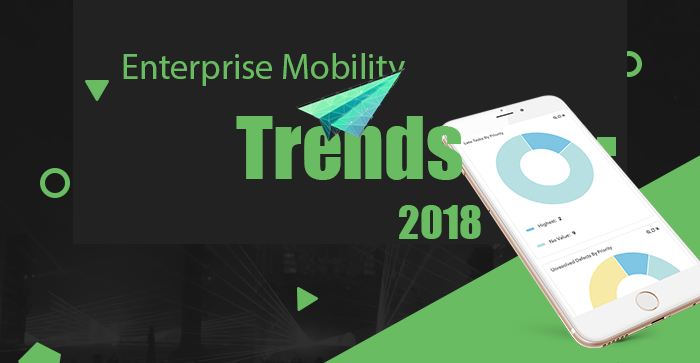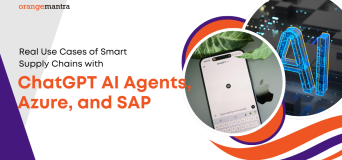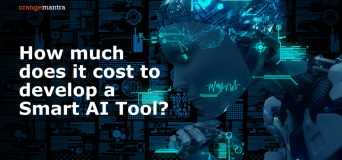Mobility is perhaps the most positive technology that enterprises have come across in the recent decades. Mobile applications have literally transformed the way people work and processes are carried out within the organizations. No wonder that a majority of entrepreneurs are making a beeline for enterprise mobility, irrespective of the model or size of their businesses. However, just having a mobile app for streamlining business operations and facilitating workforce connectivity is not enough. There is also the need to ensure that these apps are built with the latest technology trends in mind. If you are planning to invest in a new enterprise mobility solution for your business or to upgrade an existing one, here are a few current tech trends that you should know about.
Artificial Intelligence: Artificial Intelligence or AI has emerged as one of the most widely embraced trends in the enterprise mobility space. The technology has the ability to extract meaningful patterns from the available data and predict the ones that may be visible in the future. It is consistently bridging the gap between machines and workforce as well as driving intelligence into operations without human intervention. Image recognition, speech recognition, and voice recognition are a few advancements that enterprises are exploring by integrating Artificial Intelligence into their mobility solutions.
Use Cases
- AI supports real-time communication by enabling speech and text-based capabilities, which elevates the marketing strategies of enterprises.
- Apps that integrate the technology can be used for diverse purposes such as process automation, supply chain management, finance management, and more.
- Chatbots use this technology to provide seamless customer support that is comparable with that provided by human support.
Augmented Reality (AR) and Virtual Reality (VR): AR and VR may be two distinct technologies but are usually mentioned as one, considering the consolidated impact that these create. Enterprises are widely embracing these technologies as a part of their mobility solutions with the aim of tapping their unlimited potential. AR and VR are capable of blending the physical world and virtual world to drive unmatched user experiences and change the interaction between humans and machines.
Use Cases
- AR and VR-based apps are used for providing simulative training to the workforce so that they can understand the machines and processes better.
- They enable businesses to strengthen their marketing efforts by providing superlative customer experiences.
- The technologies enable the business team to conduct virtual meetings as well as make business presentations more interactive.
Internet of Things (IoT): The Internet of Things (IoT) is a technology that has taken the world by storm and the enterprises are availing its benefits too. The futuristic technology is making its way into organizations with the widespread adoption of smart sensors and connected devices. These devices are controlled with mobile apps that are specially crafted to do so. As this trend goes mainstream, enterprise apps are becoming powerful and smarter than ever.
Use Cases
- Smart sensors, together with IoT-powered apps are being widely adopted for promotion process automation.
- They enable remote monitoring of devices by providing the critical device data to the authorized users.
- IoT-enabled apps also analyze the data and deliver useful insights that can be leveraged to build strategies to make processes more result-oriented.
Blockchain: Next on the list of the latest enterprise mobility trends is the innovative blockchain technology. The technology that has gained popularity as the foundation of the Bitcoin has a lot to offer for enterprises too. Being a decentralized ledger, it records transactions in a chronological order so that they act like blocks connected with a chain. Transparency, security, and immutability are the features that are making this technology a widely accepted one.
Use Cases
- The adoption of blockchain strengthens the security of enterprise data that is shared with the users of the mobile apps.
- The communication between the devices provides the transparency which is needed for the identification of any malicious activity in the organization.
- They drive operational efficiency and productivity within the enterprise by enabling seamless collaboration between the devices and the workforce.
Cloud Computing: The growth that the cloud computing technology has witnessed in the past decade is immense. Today, as businesses become data-driven, the adoption of this technology as a part of enterprise solutions has become a norm. By taking these apps to the cloud, it becomes possible for the business to share its data with the workforce anytime and anywhere, while ensuring that the confidential information is secure at every stage.
Use Cases
- It drives round-the-clock connectivity with the workforce, which enhances their efficiency and productivity.
- Cloud-based business apps are an asset for the marketing staff as it enables them to access the business data even when they are in the field.
- It brings a significant reduction in infrastructural costs with cheaper and easily integrable cloud storage.
Conclusion
Enterprise applications are fast emerging as the lifeline of businesses today. Adoption of these applications is something that you cannot ignore, whether you are a budding startup or already an established enterprise. At the same time, you need to ensure that the mobility solution that you invest in is enriched with the latest technologies so that you can keep pace with the competitors. The best approach would be to partner with a seasoned technology partner that is capable of building a futuristic mobility solution for your business. We, at OrangeMantra, deliver expertise in several technology domains including enterprise application development. Connect with us for a custom mobile application to take your business to the next level.























